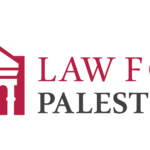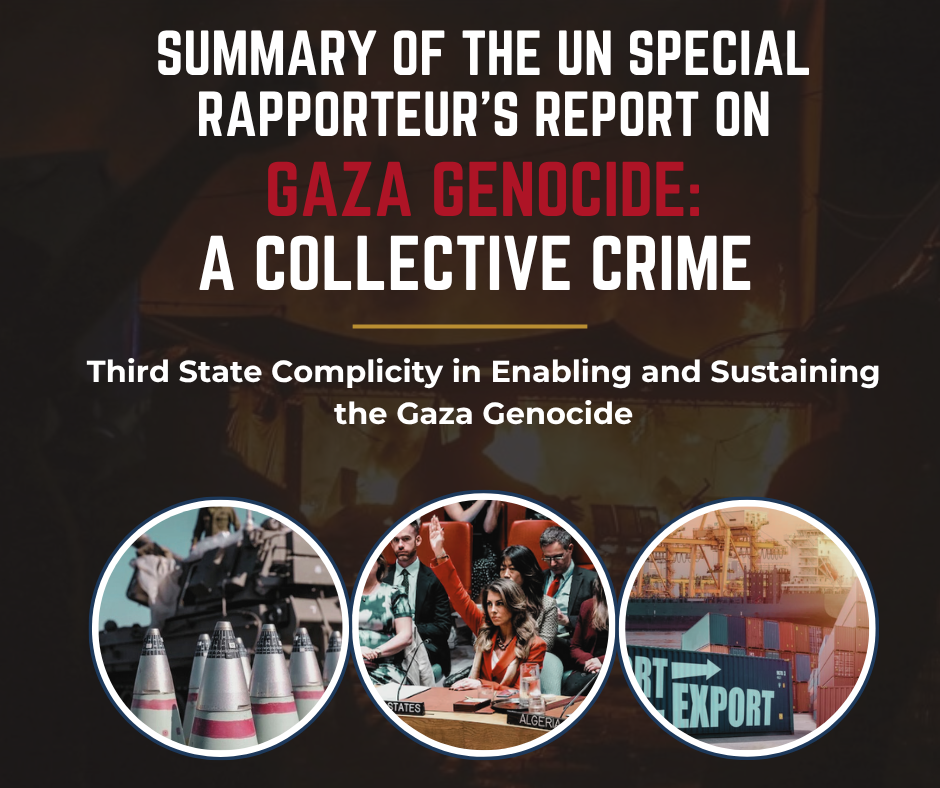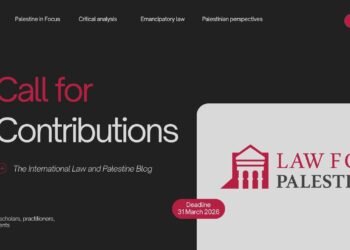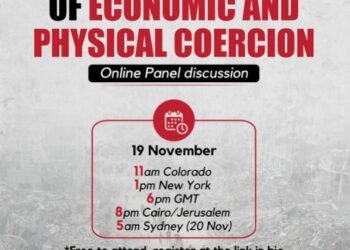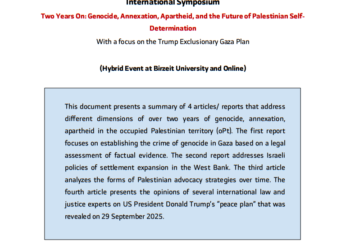Summary of the UN Special Rapporteur’s Report on Gaza Genocide: A Collective Crime
Third State Complicity in Enabling and Sustaining the Gaza Genocide
Prepared by: Yaman Midani, Polona Florijancic, and Henriette Willberg
* Click here to read or download this material in PDF format
Overview
On 20 October 2025, the Special Rapporteur on the situation of human rights in the Palestinian territories occupied since 1967, Francesca Albanese, published her latest report entitled “Gaza Genocide: a collective crime”. The report finds that the ongoing genocide in Gaza constitutes a collective crime, enabled and sustained by the complicity of influential Third States that have long supported and protected Israel’s systemic violations of international law. Underpinned by colonial narratives, their provision of sustained military, economic, and diplomatic assistance have facilitated these atrocities, leading to a widening divide between governments and their populations.
The report identifies and examines four key sectors in which Third States provide aid and assistance to Israel’s unlawful occupation and its genocide of the Palestinian people:
- Diplomatic and political actions: Third States have shielded Israel from international accountability, reproducing its narratives, defending its policies in multilateral fora and failing to take concrete political measures, beyond symbolic gestures, which were required to bring an end to Israel’s crimes and violations.
- Military ties: Third States have continued to supply Israel with weapons, intelligence and operational support that provide the means of destruction in Israel’s genocidal campaign in Gaza.
- Weaponisation of Humanitarian aid: Third States have facilitated the deterioration of conditions of life in Gaza, enabling or failing to prevent the weaponisation of aid, attacks on humanitarian infrastructure and actors, and the imposition of a blockade that caused famine, mass casualties, and forced displacement.
- Economic and trade relations: Third States have maintained, and in some cases increased, trade, investment and financial relations with Israel, including the supply of dual-use goods, military technologies, fuel, and critical infrastructure, thereby sustaining its economy, occupation, and ongoing acts of genocide.
The Special Rapporteur stresses that the credibility of the international rule of law now hinges on whether States confront this complicity, fulfil their legal obligations, and ensure accountability and justice for serious breaches of international law, including the perpetration of genocide and the failure to prevent it. The repeated failure of Third States to hold Israel accountable reveals what the Special Rapporteur calls “the flagrant double standards of the international community” (para 4).
The Special Rapporteur concludes that Israel’s unlawful occupation and the ongoing genocide in Gaza are being sustained by an abject failure of Third States to abide by their longstanding obligations, often combined with their direct support, rendering these atrocities an “internationally enabled crime” (para 2). Since October 2023, Israeli violence has escalated sharply, while powerful States have continued to provide diplomatic, military, economic, and humanitarian-related support that legitimises, equips, and financially sustains the genocide.
Legal context and framework
The report begins by setting out the legal framework for State responsibility under international law (paras 6-12). International law establishes binding obligations on all States to respect, protect and fulfil international law and to prevent and bring an end to serious violations thereof, including genocide, apartheid, and the denial of the right to self-determination. The report organises these obligations into four categories (para 6):
- Direct obligations which all States owe to the Palestinian people and/or to the State of Palestine;
- Obligations erga omnes which arise from Israel’s breach of peremptory norms, including a positive obligation to, individually and cooperatively, bring any unlawful situation to an end; and negative duties to not recognise as lawful a situation arising from their breach or render aid or assistance to maintain that situation.
- Obligations of due diligence to prevent specific violations of international law, including the obligation to prevent genocide, triggered when a “serious risk” arises; to ensure respect for international humanitarian law, triggered when violations are “likely or foreseeable”; and to cooperate to prevent crimes and attacks on internationally protected persons.
- Obligations to refrain from aiding or assisting, or directly participating in the internationally wrongful acts of other States
States must use all available means to discharge these duties, taking into account the circumstances, the gravity of the violations and their level of influence over the violating State and the means they have to exert this influence (para 7). Consideration of the obligations and discretionary rights available to States in specific legal instruments provide clear modalities that are relevant to this assessment, including (para 8):
- Forcible measures under the UN Charter against a State in violation of Article 2(4), the prohibition of use of force, Third States may intervene and use force on request of a State acting in self-defence; pursuant to a UNSC Resolution under Chapter VII of the UN Charter; or under the Uniting for Peace resolution;
- Risk assessments and arms embargoes, including prohibitions of transit and trans-shipment under the Arms Trade Treaty;
- Trade embargoes, particularly under WTO law as well as under bilateral free trade and investment agreements, which allow States to deviate from core trade principles to fulfil their obligations under the UN Charter relating to peace and security;
- Denial of safe passage within the framework of UNCLOS to prevent ‘non-innocent passage’ and to counter risks of complicity in international crimes and violations of UN Charter obligations or peremptory norms; and
- Prosecution and punishment of genocide, crimes against humanity, war crimes and torture, as an obligation under the Geneva Conventions and customary law.
Situations of “sustained and intersecting violations of peremptory norms” and in the context of the duty to prevent genocide, may require – not merely permit – Third States to take these actions to fulfil their direct, erga omnes and due diligence obligations, unless less intrusive measures would genuinely suffice (para 9). And failure to so act, may constitute direct participation in or aid and assistance to internationally wrongful acts of other states.
Complicity arises where assistance materially facilitates unlawful acts and is provided with full knowledge of the circumstances and, where relevant, the perpetrator’s special intent (para 10). The Third State’s intent to facilitate the wrongful act can be reasonably inferred from the “foreseeable consequences” of that State’s actions (para 11).
Such assistance may include the provision of funds, weapons, diplomatic protection, fuel, intelligence, diplomatic pressure or sanctions, or the implementation of orders and arrest warrants.
The report states that where the conduct of Third States is “direct, indispensable and constitutive”, it is necessary to consider whether a State’s involvement goes beyond aid and assistance to constitute joint participation in an internationally wrongful act (para 12). The Special Rapporteur draws parallels with the concept of a ‘joint criminal enterprise’ under individual criminal responsibility, noting that mutatis mutandis a State’s contribution amounting to a constituent element of the crime would suffice. In the case of genocide, direct State responsibility may arise when the conduct which can be attributed to a State is “integral to the commission of one or more genocidal acts” and when the State formed genocidal intent “based on the totality of conduct attributable to it” (para 12).
The Special Rapporteur in her report sets out several key threshold markers for Third State Responsibility in the case of the Occupied Palestinian Territory. First, concerning the duty to prevent genocide, where she notes that for decades, Israeli violations (including but not limited to occupation, apartheid, blockade, and systemic violence) have been formally recognised by the ICJ and UN bodies and, even on October 6, the situation was “primed for genocide” (para 13). After 7 October 2023, Israel’s crimes intensified and numerous warnings of genocide were issued, culminating in the initial Provisional Measures issued by the ICJ in January 2024. This provided confirmation of the serious risk of genocide in Gaza, and confirmed the duty to prevent.
The second threshold marks the turn toward complicity in genocide. This is marked by subsequent judicial developments, including further Provisional Measures in South Africa v Israel, the ICJ’s judicial comment in Nicaragua v Germany, and the decision of the Prosecutor of the ICC to seek arrest warrants. Cumulatively, the Special Rapporteur observes this as providing Third States with “actual or constructive knowledge” of ongoing international crimes (para 14), being knowledge that triggered a heightened responsibility to act and activated concerns as to Third State complicity.
Following this, two further developments have solidified the legal landscape within which Third States must act. The ICJ Advisory Opinion from July 2024 determined that Israel’s presence in the Occupied Palestinian Territory was illegal and must be ended as rapidly as possible. The UN Commission of Inquiry’s conclusion in September 2025 that Israel is committing a genocide in Gaza further reaffirmed States’ obligations to prevent genocide, to stop aiding and assisting or being complicit in genocide, and to punish its perpetrators (para 16).
The Special Rapporteur finds this intertwined legal situation has two significant consequences for understanding Third State Responsibility (para 17):
- States’ intersecting duties must be assessed holistically and give rise to an imperative on all States to take measures to discharge their obligations
- It is both legally and practically impossible to distinguish between Israel and the Occupied Palestinian Territory. Since Israel itself is unwilling or unable to make this distinction, Third States must “presume indistinguishability”, meaning that they must impose a comprehensive boycott of Israel.
States can no longer claim ignorance of Israel’s aggression, international crimes, and denial of the Palestinian people’s right to self-determination. The Special Rapporteur acknowledges the role of Third States, whose failure to uphold their own obligations has created the “conditions for their complicity in ongoing Israeli crimes” (para 18).
Intersecting Components of the Gaza Genocide:
A. Genocide Under the Guise of Diplomatic and Political Actions
In this section, the Special Rapporteur examines the nexus between Israel’s genocide in Gaza and the conduct of Third States to holistically assess the extent and scope of their own violations.
Prolonged diplomatic backing from powerful Third States and their reproduction of Israeli fabrications has enabled Israel’s assault on the Palestinian people, their oppression, domination, and erasure, and muted urgent calls for action while obscuring the political, financial, and military interests at play (para 19). Since 7 October 2023, many Western governments have adopted and amplified Israeli narratives, based on discredited claims, framing genocide as self-defence, and erasing the distinction between Palestinian civilians and combatants (para 20).
The Special Rapporteur records how diplomatic efforts following 7 October avoided calls for a permanent ceasefire, instead seeking to “manage” the ‘humanitarian crisis’ and promoting temporary measures that allowed the violence to continue, while shielding Israel from international accountability (para 21). State conduct at the UN has provided “diplomatic cover” for the Israeli genocide, from the US’s use of its veto at the UN Security Council to absentions, delays, and diluted rhetoric, which hindered action whilst creating an “illusion of progress” (para 22). The use of targeted and limited sanctions have also done the same, diluting and deflecting the concern onto isolated actions, targeting individuals, settlers, and organisations rather than addressing the Israeli state system (para 23). Whilst some action has come from Arab and Muslim states, this has not been decisive and many States, such as Qatar and Egypt, maintain significant relations with the US and Israel (para 24).
Although a few non-Western states have sought accountability for Israel’s actions through international courts, noteably the ICJ in the case of South Africa and Nicaragua, most Western nations have denied claims of genocide, avoided supporting related cases, undermined arrest warrants issued by the ICC, and taken steps to weaken or evade international legal mechanisms (para 25). Israel has been able to launder its reputation as it continues to participate in sports and cultural events (para 26).
The Special Rapporteur notes that despite the ICJ’s landmark Advisory Opinion declaring Israel’s presence in the Occupied Palestinian Territory illegal, no action has been taken (para 27). Although the UN General Assembly endorsed the opinion in Resolution ES-10/24 and outlined steps for Israel and other States to end the occupation, these measures remain unimplemented. Statehood recognitions—often conditioned in ways that undermine self-determination—have served primarily symbolic purposes without altering the situation on the ground (para 28). Few States have severed diplomatic ties with Israel (para 29), while many have endorsed the 2025 “Trump Plan,” despite its failure to address the unlawful occupation, ensure accountability, or provide justice. Instead, the plan entrenches external control over Gaza, further undermining Palestinian self-determination and sovereignty (para 31). Accordingly, post-October 2023 diplomatic conduct reflects systemic global complicity, sustaining genocide and obstructing lawful political solutions under international law.
B. Military Ties: providing the means of destruction
Despite decades of UN calls for an arms embargo on Israel, many States continue to supply weapons, military technology, and logistical support, directly enabling Israel’s unlawful use of force and mass atrocities (para 31). Israel’s military dominance depends heavily on foreign weapons imports, whose supply has continued despite mounting evidence of genocide (para 32). The United States, Germany, and Italy are the most significant contributors, while other States facilitate indirect and dual-use transfers that sustain Israel’s military capacity in Gaza (paras 32-39).
The Special Rapporteur devotes several paragraphs of the report to examining the financial, operational and military support provided by the United States over decades of cooperation agreements, military and economic aid, and preferential access to US military sales (para 33). Since 7 October 2023, this support has increased substantially, including through the approval of a $26.4 billion defense package (para 34) and the delivery of hundreds of arms shipments (para 35).
Germany has been Israel’s second-largest arms exporter during the genocide, authorising €489 million in export licences between October 2023 and July 2025, support justified on the basis of post-Holocaust obligations to Israel (para 37). The UK has facilitated US supply lines from its military bases in Cyprus and conducted over 600 surveillance missions over Gaza sharing intelligence that appears to go beyond the stated purpose of “hostage rescue” (para 38).
Other States have supplied parts, components and weapons, often within the military transfer system that obscures transfers, including ‘dual use’ or indirect transfers (para 39). The Special Rapporteur points to the F-35 fighter jet programme, involving 19 States, as one example of this opaque military transfer system that has supplied Israel with parts used heavily in the genocidal destruction of Gaza (para 40). Arguments that such weapons are “defensive” or “non-lethal” are distinctions that are not recognised under the Arms Trade Treaty, which requires a holistic assessment of how all arms, parts and components will ultimately be used. Since the occupation itself is illegal, nothing Israel does in the occupied territories can be understood as “defensive” (para 41).
Despite acknowledging concerns, States have continued to authorise arms exports and transit to Israel, maintaining existing agreements and facilitating transfers in a manner that suggests complicity in Israeli crimes (para 42). Support has also taken the form of military partnerships and joint defense manoeuvres (para 43), an absence of investigations and prosecutions of nationals who have served in the Israeli military since October 2023 (para 44), and the purchase of Israeli ‘combat-proven’ military and surveillance technologies (para 45-6).
C. Weaponization of aid: creating the living conditions for genocide
In this section of the report, the Special Rapporteur examines how Third States have “facilitated” the deterioration of conditions of life of the Palestinian population in Gaza, particularly in the context of aid provision, by suspending funding to UNRWA; setting up the deadly Gaza Humanitarian Foundation, which facilitated displacement; participating in stunts aimed at appeasing public concern while the famine worsened, such as the parachuting of aid into Gaza, and through their silence and inaction when civil society groups attempting to break the siege were illegally intercepted by Israel in international waters (paras. 51–54), thereby implicating themselves in the severe harm inflicted on civilians (para. 55).
Before 7 October 2023, Israel and Egypt’s blockade left 80% of Gaza’s population reliant on aid, with 1.1 million depending on UNRWA, which distributes assistance through over 400 local sites (para 48). Since October 2023, Israel has weaponised humanitarian aid in Gaza, enforcing a total blockade that has reduced deliveries to less than one-third of pre-war levels, contributing to famine and hundreds of malnutrition-related deaths (para 49).
States by their actions have aided and assisted Israel as it transparently violated its obligations to ensure the Palestinian population of Gaza has adequate means of survival through a genocidal campaign that deliberately targets the humanitarian system, including attacks on UNRWA facilities and personnel, defamation of the agency, and the promotion of pseudo-humanitarian agencies (paras 50, 53-54).
D. Economic and Trade Relations: the fuel and profits of genocide
In this section, the Special Rapporteur explores how international trade and economic cooperation sustain and legitimise Israel’s apartheid regime and unlawful occupation.
Israeli imports, including dual-use goods, provide the necessary goods to sustain its illegal occupation and unlawful policies (para 57). Israel’s exports, totaling US$474 billion between 2022 and 2024 fuel the economy and enhance arms manufacturing capacity through the export of dual-use items such as integrated circuits which are essential to Israeli military systems that “surveil, control, and kill” Palestinians (para 58).
Economic cooperation with Israel goes beyond trade, with the EU supplying €2.1 billion in grants and funding to Israeli science and innovation entities—many developing dual-use and military technologies; The European Investment Bank financing Israeli entities with €2.7 billion; and economic cooperation extending to several other agreements (paras 60-61).
Rather than suspending trade and economic agreements to meet their legal obligations, many States have actually increased their trade with Israel during the genocide (para 62). This is despite the fact that obligations to act against violations of international law are often incorporated into bilateral treaties, such as the EU-Israel Association Agreement (para 63). Suspension should also apply to trade of dual-use products, which represented 38% of EU–Israel trade in 2024 (US$17.5 billion) (para 64).
Most States continue supplying Israel with fuel and raw materials or providing key port access, while the EU and Egypt import gas through the Eastern Mediterranean pipeline, which illegally passes through Palestinian waters. Egypt expanded these ties with a US$35 billion natural gas deal in August 2025 amid starvation in Gaza (para 65). Third States’ transportation infrastructure enables Israel’s trade and supply of materials and weapons, including F-35 parts, fuel, and other goods, through ports in Türkiye, France, Italy, Belgium, the Netherlands, Greece, Morocco, and the US, as well as airfields in Ireland, Belgium, and the US. While port workers in multiple countries have blocked illicit shipments, Israel often conceals transfers by disabling transponders, rerouting shipments, or using Third State traders, with some states, including Belgium and Spain, facilitating the transit (para 66).
Conclusion
The Special Rapporteur concludes that the genocide in Gaza is the product of a system of global complicity, in which many States, particularly in the West, continue to perpetrate colonial and racial-capitalist practices and provide military, diplomatic, economic, and ideological support to Israel, even as it weaponised famine and humanitarian aid (para 67).
The Special Rapporteur finds that the “acts, omissions and discourse” of Third States which support Israel’s genocidal and apartheid regime are such that they “could and should be held liable for aiding, assisting or jointly participating in internationally wrongful acts”, namely that they constitute complicity in such acts (para 68). States must immediately suspend and review “all military diplomatic and economic relations with Israel”, as such support could constitute aiding, assisting or directly participating in war crimes, crimes against humanity and genocide (para 68).
The Special Rapporteur finds that many Third States have operated with impunity and that their disregard for international law threatens the foundations of the multilateral order and the idea of a common humanity (para 69). Accountability must extend beyond criminal prosecutions to include reparations, such as restitution, compensation, rehabilitation, satisfaction, and guarantees of non-repetition, owed not only by Israel but also by the States that enabled its crimes (para 69).
The Special Rapporteur’s conclusions are definitive: coercive global structures must be dismantled, military and political support must be suspended and complicity in genocide must end (para 70).
Recommendations
The Special Rapporteur reminds States of their legal obligations “not to participate in or be complicit in Israeli violations” and to prevent and address serious breaches of international law (para 71). The Special Rapporteur urges States to cause no further harm to the Palestinian people and to:
- Exert pressure for a complete and permanent ceasefire and full withdrawal of Israeli troops;
- Take immediate steps to end the siege in Gaza, including deploying naval and land convoys to ensure safe humanitarian access and mobile housing before winter;
- Support the re-opening of Gaza’s international airport and port to facilitate aid delivery.
The Special Rapporteur also emphasises that States have an obligation to uphold Palestinian self-determination and justice, as this is fundamental to lasting peace and security, and therefore should:
- Suspend all military, trade and diplomatic relations with Israel;
- Investigate and prosecute all officials, corporates and individuals involved in or facilitating genocide, incitement, crimes against humanity and war crimes, and other grave breaches of international humanitarian law;
- Secure reparations, including full reconstruction and return;
- Cooperate fully with the International Criminal Court and the International Court of Justice;
- Reaffirm and strengthen support to UNRWA and the UN system as a whole;
- Suspend Israel from the United Nations under Article 6 of the UN Charter;
- Act under “Uniting for Peace”, in line with General Assembly resolution 377(V), to ensure that Israel dismantles its occupation.
Finally, the Special Rapporteur calls on trade unions, lawyers, civil society, and citizens to hold States, institutions and corporations to account by advocating for boycotts, divestments and sanctions, until Israel ends its illegal occupation and related crimes.

